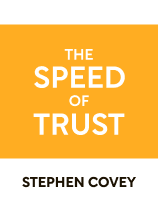

This article is an excerpt from the Shortform book guide to "The Speed of Trust" by Stephen M. R. Covey. Shortform has the world's best summaries and analyses of books you should be reading.
Like this article? Sign up for a free trial here .
How can you build a reputation in business quickly? What are the consequences of having a bad reputation? How can you improve your business reputation?
In Stephen Covey’s book, The Speed of Trust, earning the trust of others is one of the key factors Covey highlights for building a positive reputation. Covey advises business owners to focus on how trustworthy their company is perceived when trying to build or improve business reputation.
Read on to learn Covey’s advice for building a reputation in business that will earn you more loyal customers.
A Strong Business Reputation Starts With Trust
To build a business reputation, Covey says just as an individual gains others’ trust by consistently acting with integrity, people are more likely to trust an organization when they see alignment between its nature (mission statement, values, and so on) and its track record.
Organizations that are perceived as trustworthy reap huge trust dividends. They have more eager and willing collaborators and more opportunities because people want to work with them, asserts Covey. Building a reputation in business also benefits companies with increased efficiency because their trusted reputation allows them to operate with less red tape, oversight, and checks and balances. Consistently producing results magnifies these benefits.
(Shortform note: Consumers who share their opinions on social media have a great deal of influence on building a business reputation. Therefore, disappointing customers by not delivering what your brand promises is riskier than ever for a business, as many people will likely find out about it quickly. In contrast, brands that deliver consistently are poised to reap even more trust dividends from happy customers on social media.)
To build a reputation in business, focus on creating a reputation for strong principles and transparency to bring trust dividends in the form of a larger and more loyal customer base. Additionally, many consumers are willing to pay a higher price for products they trust. For example, people pay more for fair trade coffee or Oeko-Tex-certified fabrics because they have more trust in products that carry this label. While they may not be able to distinguish fair trade from conventional coffee in a blind taste test or the feel of Oeko-Tex-certified and conventional fabrics, their trust in the labels (and the insight into the production process the labels provide) impacts the value of the product.
| Building a Business Reputation With Trustworthy Labels The steadily growing demand for food products carrying the USDA organic label illustrates how trust shapes consumer preferences and could affect building a reputation in business. Many consumers concerned about their food’s production methods trust organic produce to be a healthier choice for humans and the environment. Therefore, farmers and retailers making and selling certified organic food at a premium reap trust dividends from the label. The USDA organic label also highlights how fraud in the marketplace can reduce transparency and lead to trust taxes. Many nonorganic producers try to capitalize on the high consumer demand for organic produce by “greenwashing” their products with buzzwords such as “all-natural,” “farm fresh,” “artisanal,” and so on. The distrust created by label copycats can lead to trust taxes for organic producers when consumers get confused and frustrated, losing trust in labels in general. |

———End of Preview———
Like what you just read? Read the rest of the world's best book summary and analysis of Stephen M. R. Covey's "The Speed of Trust" at Shortform .
Here's what you'll find in our full The Speed of Trust summary :
- Why trust is the ultimate key to success
- A roadmap for building and leveraging trust
- An explanation of Steven Covey's “four cores of credibility”






